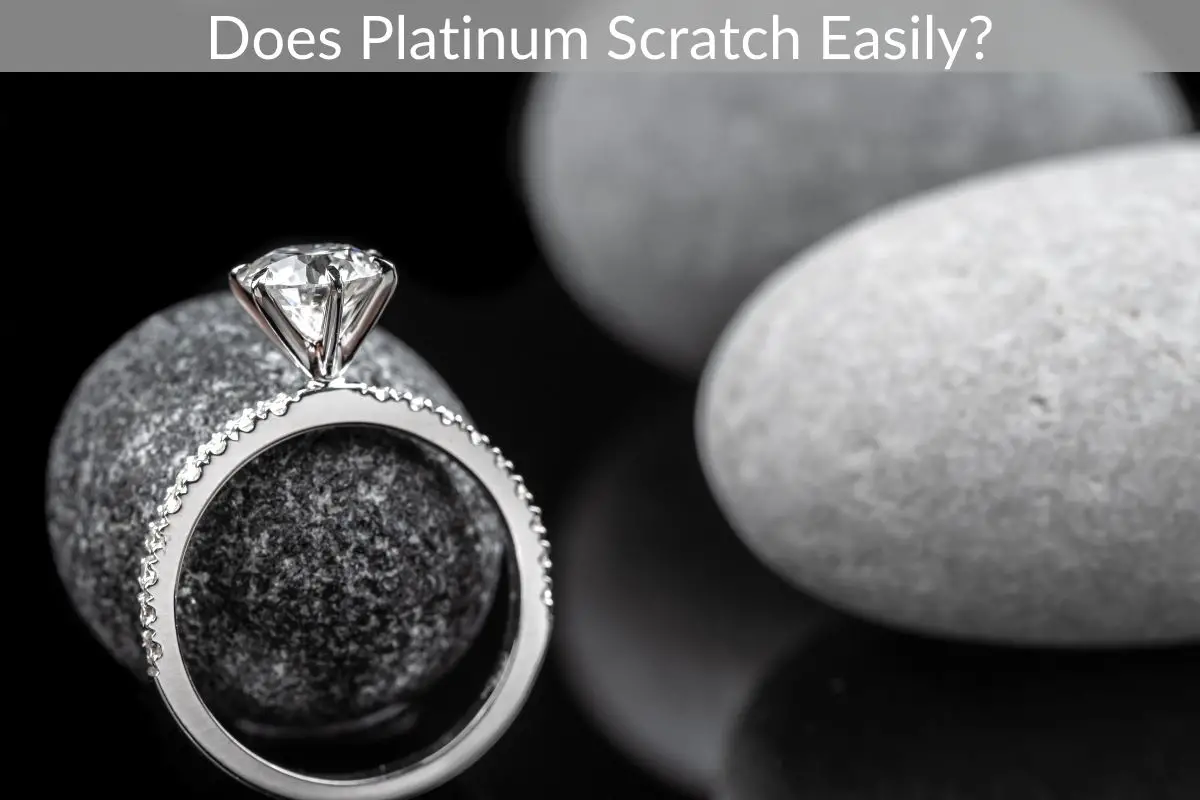Table of Contents
*This post may contain affiliate links. As an Amazon Associate we earn from qualifying purchases.
Your husband recently gifted you a platinum ring on your birthday. You have been wearing it everywhere and don’t feel like taking it off… that’s how much you love it! One evening, while walking out of a restaurant with your friend, you fall on the pavement and scratch your knees.
Your eyes immediately fly to your ring to ensure you did not break it when you supported yourself on your hands. Everything seems fine.
Your friend drives you to your house, uses the first aid kit to bandage your knees, and tells you to rest. After a few days, you are going to a party, deciding what jewelry to wear. You take off your platinum ring. As you are about to place it in the jewelry box, you see a scratch on the band. You inspect it closely, and there it is − a scratch with a different shine.
This scenario makes it clear: Platinum does scratch easily!
Does this mean you should buy white gold or yellow gold instead?
If you are looking for durability, you will find platinum a better choice. However, if you are looking for strength, white gold and yellow gold are much better options since the ratio of other metals in white gold and yellow gold is higher than that in platinum.
These additions give both gold types strength, although durability is compromised. Since platinum jewelry contains 95% of white metal and the remaining 5% comprises nickel, palladium, and silver, it lasts longer.
This is because the higher the ratio of other metals in the jewelry with the primary metal, the stronger it will be and less resistant to scratches. So, from this, it’s obvious that platinum will scratch easily.
Now you know a downside of keeping platinum jewelry. Now, let’s take a look into the matter in detail. To see some of the most popular platinum jewelry just click here.
Platinum on the MOHs Hardness Scale
| Mineral | Scale | Common Objects |
| Diamond | 10 | |
| Corundum | 9 | |
| Topaz | 8 | |
| Quartz | 7 | Steel File (7.5) |
| Orthoclase | 6 | |
| Apatite | 5 | Knife Blade (5.1), Glass (5.5) |
| Platinum | 4.5 | Wire Nail (4.5) |
| Fluorite | 4 | |
| Calcite | 3 | Penny (3.5) |
| Pure Gold | 2.5 | Finger Nail (2.5) |
| Gypsum | 2 | |
| Talc | 1 |
The MOHs scale of hardness tells you which metals are harder and whether they can get scratched or not. Looking at the table above, you can see that platinum is above pure gold. Since the latter material is softer, it gets scratched more easily. You will find a diamond right at the top, which tells you it does not get scratched easily.
The lower the material on the scale, the less it is used in jewelry making. For this reason, pure gold is mixed with other metals to make sure the jewelry is not malleable.
You cannot determine a metal’s strength based on the MOHs scale alone. Other factors contribute to this characteristic, like how the metal reacts when it collides with a hard surface.
Is Platinum Scratch-Resistant?
We have established that platinum has less strength compared to white gold, yellow gold, and silver, and here’s why:
- It is purer than white gold
- It is malleable
- It is softer than white gold
One of the biggest differences between the metals mentioned above and platinum is that the latter us denser. For example, if a standard gold ring weighs 3.1 grams, a platinum ring in the same design will weigh more.
This is because platinum is 60% heavier than gold. The molecular structure of platinum is different than that of gold. In the former, the molecules are tightly packed together, whereas they are far apart in the latter.
Thanks to this feature, platinum is used in pure form, and gold is not.
You might be thinking platinum must be strong if it is denser than gold. Then, why does it get scratched? Though this white metal is strong, it is a soft metal, softer than 14K gold. So, when it makes contact with a hard surface, it gets scratched. The scratches appear micro at first; however, with constant exposure to bumps and drags, the scratches increase and give the platinum jewelry a dull appearance.
In comparison, white gold is much stronger! How?
Well, it contains 14K gold and other metal alloys, which make white gold stronger when combined together. White gold jewelry does lose its shine over time due to the rhodium finish fading. However, this can be easily fixed by re-polishing the jewelry.
How Does Platinum React to Scratches?
The way white metals react to scratches differs from metal to metal. For example, white gold loses some of its metal when it gets scratched. The metal residue transfers to the surface it was scratched against. On the other hand, when platinum gets scratched, the metal simply shifts places but stays on the jewelry.
This makes the jewelry dull. Unlike white gold, platinum does not tarnish. However, it develops patina, a matte finish that gives platinum an antique look. In extreme cases, you might even see greenish-brown shades on the ring. Some people love this look and even desire it. They believe it gives the ring a more pleasing look. If you are not one of them, don’t worry; you can get the jewelry polished by a professional.
Conclusion
So, platinum jewelry does get scratched. However, there’s a way to avoid this from happening. You could limit its use when you are going out running or hiking or doing some strenuous activity. Since platinum does not react to sweat, chlorine, and chemicals due to its pureness and hypoallergenic property, you can wear it indoors at all times.
We still advise taking it off when you are taking a shower and doing your night care routine.
However, keep in mind that platinum is not that hard. Based on the MOHs scale, it’s malleable, which means it will bend upon hard impact. So, when wearing platinum jewelry, take extra care not to bump into something.




